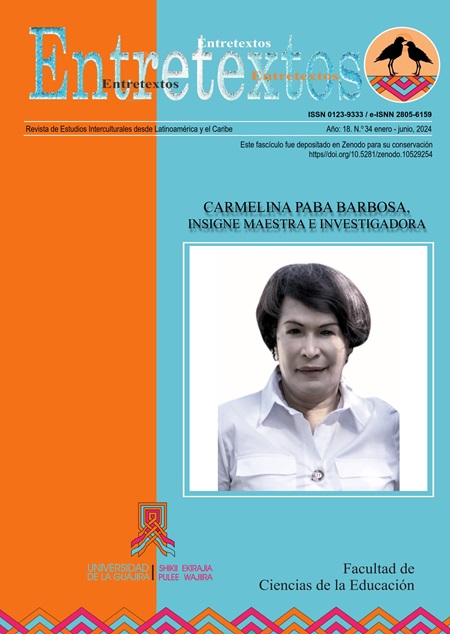Abstract
These woven words are for the Colombian and the world natives’ brothers, to that brothers they are interested in deepening their knowledge about the words they pronounce in their native language, the amazing wisdom of the grandparents too. The sound of every word that our elders pronounce, contain that life sense that narrate about be indigenous, and be wayúu, this is where this analysis become relevant, of the sound of every words, which says in the native language, in this case the wayuu language called wayuunaiki, refers to the semantic flow contained in every unit of articulation of a consonant with a vowel or geminated vowel as well as it is diphthong, o different vowels, we have the case of the expression of the word /ei/ that means mothers, and to say /my mother/ it writes /tei/ where the consonant /T/ indicates belonging or possession. The words as an unit apparently individual, when get analyses every sound based on the meaning of cultural facts that enounce in the origin stories, is here when begins that semantic flow to finding that sense of life, for reach that maturity of study analysis of the native word, its important to have a broad knowledge about the origin narratives, and keep the activity of walking the territories in every geography place and weave that dialogues about sacred stories with the differents sages that they are completely monolingual , the bilingual are sages who have been castrated for the university education. Sense of life is a creative proposal that permits explain and share our vision and this way proposes another way to writing for the revitalization of the native word and the cultural concepts.
References
Autores varios. (2016). Tü natüjalakat wayuu: los que saben los wayuu. Fundación Universidad de Bogotá Jorge Tadeo Lozano.
Borja Gómez Jaime Humberto (2002). Los indios medievales de fray Pedro de Aguado: construcción del idólatra y escritura de la historia en una crónica del siglo XVI. Centro Editorial Javeriano, Bogotá.
Botero Uribe Darío (2003). Vitalismo cósmico. Siglo del hombre Editores. Bogotá.
Ceballos Gómez Luz Diana (1995). Hechicería, brujería e inquisición en el Nuevo Reino de Granada, Un duelo de imaginarios. Universidad Nacional de Colombia-Medellín.
Duranti, Alessandro (2000) Antropología lingüística. Cambridge University. Traducción Ruíz de Alarcón, Madrid España.
Fals Borda Orlando (2010). El socialismo raizal y la Gran Colombia bolivariana. Fundación Editorial El Perro y la Rana. Caracas-Venezuela.
Green Abadio (2011). Anmal gaya burba: isbeyobi daglege nana nabgwana bendaggegala. Significados de vida: espejo de nuestra memoria en defensa de la madre tierra. Universidad de Antioquia-Medellín.
Green Stocel, A. (2011). Significados de vida: espejo de nuestra memoria en defensa de la madre Tierra. Tesis doctoral. Universidad de Antioquia, Medellín, Colombia. Recuperado: http://hdl.handle.net/10495/6935
Ipuana Ramón Paz (1976). Mitos, leyendas y cuentos guajiros. Instituto Agrario Nacional. Caracas-Venezuela.
Mercado Epieyu, Rafael Segundo (2010). Lingüística: Herramienta fundamental para hacer algunas reflexiones sobre el cambio de significado de palabras en wayuunaiki y de la creencia del Wayuu. Trabajo de Grado. Facultad de Ciencias Humanas. Departamento de Lingüística, Universidad Nacional de Colombia. Bogotá.
Mercado Epieyu, Rafael Segundo (2017). La dimensión pedagógica de la palabra de los wayuu. Relatos ancestrales y escritura. Tesis de Maestría en Educación, Universidad de Antioquia, Medellín, Colombia. Recuperado: http://hdl.handle.net/10495/12397
Mercado Epieyu, Rafael Segundo (2017). La dimensión pedagógica de la palabra de los wayuu: Relatos Ancestrales y Escritura. Tesis de Maestría en Educación. Universidad de Antioquia-Medellín.
Mercado Epieyu, Rafael Segundo (2018). Miedo a educar como wayuu. Revista Caminos educativos. Editorial Universidad de Cundinamarca, seccional Girardot. Colombia. Recuperado: https://www.ucundinamarca.edu.co/documents/comunicaciones/revista-caminos/caminos-educativos-5.pdf
Paz Ipuana Ramón (2016). Ale´eya Tomo I. Fondo Editorial Wayuu Araurayu.

This work is licensed under a Creative Commons Attribution-NonCommercial-NoDerivatives 4.0 International License.
Copyright (c) 2024 Rafael Segundo Mercado Epieyu


